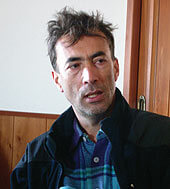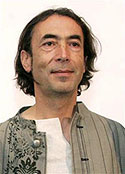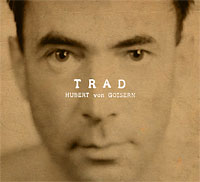AUSLAND
Descending, soaring
[...] The Trad albums offer touching examples of von Goisern's musical origins, a part of his sources. The melodies that he has translated virtually directly from the mouths of folk (songs) into "Von Goisern-ish" are "something akin to the original substance" of his musical expression, his "ABC in notes".
The best thing is to buy the CD box set, which aside from the three albums – two TradCDs and the CD Ausland, which documents the live concerts of the Trad Tour 2004 – also contains a DVD: the film about the concert trip to Mail for Festival au Desert in Timbuktu in 2005. Yodelling while wearing a Tyrolean hat on one's head, next to the Tuaregs' camels. An unusual experience. But von Goisern believes in the music and in a world in which these things go side by side with respect and solidarity.
In Vienna and Timbuktu this time too
Hubert von Goisern has been abroad again
 Hubert
von Goisern originally didn't want to give lots of concert on last year's Trad tour,
which should have ended his folk song phase, only thirty in fact, but
it ended up being more than a hundred. And where didn't he and his band
play: the live recordings for the CD, called Ausland,
arose in Bad Aibling, Würselen, Freiburg, Oldenburg, Trier, Soest
and Vienna in any case. For Vienna would be abroad for this kind of music
too, says Goisern. Although there's yodelling in Vienna too, although
it is different. There's tootling there. An excellent example for it
is Trude Mally.
Hubert
von Goisern originally didn't want to give lots of concert on last year's Trad tour,
which should have ended his folk song phase, only thirty in fact, but
it ended up being more than a hundred. And where didn't he and his band
play: the live recordings for the CD, called Ausland,
arose in Bad Aibling, Würselen, Freiburg, Oldenburg, Trier, Soest
and Vienna in any case. For Vienna would be abroad for this kind of music
too, says Goisern. Although there's yodelling in Vienna too, although
it is different. There's tootling there. An excellent example for it
is Trude Mally.
But in any case, the songs on these recordings come from the Salzkammergut of course and sound less introverted live than on the two studio Trad CDs. The joy of playing is evident with the musicians and the available material probably works naturally more alive and simply better played live. Some exotic-seeming instruments associate themselves with the native ones, but all in all, the songs and yodels work most intensively when they move close the originals. Ausland can in any case be seen as a successful conclusion of this phase of contemporary renovation of these special traditional songs.
And then there's the DVD with the title Warten auf Timbuktu, a 45 minute long film about the concert trip to Mali to this year's Festival au Desert. This festival has been taking place since 2001 and has since developed into a meeting place between Tuaregs and artists from other parts of Mali, Africa and the world. The journey there was laborious and strenuous, slow and with several days of waiting, the musicians and crew tormented themselves with small boats without engines, a small Kyrgyzstani aeroplane with Russian crew, with trucks and buses, finally a taxi to the place of the event. And here on the stage in the desert of Essakane, Hubert von Goisern and his band appear one last time in January 2005. A worthy conclusion.
With this release, it will probably be the end for new material for a long time, for in the next few years, Hubert von Goisern is giving himself a break again. But he will certainly travel again, so we don't need to worry too much. At least the club anthem he has composed for the newly founded football club Red Bull Salzburg remains for us in the meantime.
Bad Goisern's sand in the Sahara desert
Hubert von Goisern and his experiences in Africa: a high point of the Bergfilmfestival in "Das Kino" on Friday
Hubert von Goisern is an individualist in every respect. Who else would travel to the end of the world to present their music? In the course of his Trad II tour, he travelled with his band and cameraman, Peter Pfund, to the Festival au desert in the African desert at the beginning of the year. There arose Hubert von Goisern's debut film Warten auf Timbuktu, which was premiered on Friday (18.11.) in Das Kino.
In Warten auf Timbuktu one becomes acquainted with waiting in other dimensions. "In Mali time stands still", explains Hubert Achleitner (as the Goiserer is really called) at the beginning of the film. He charmingly and touchingly sketches the everyday life of these people, as well as is possible in an hour. Everything is slow. Travel practices without traffic signs, tent evenings in the open air, solitary camel rides in the desert ... A film which invites you to examine this continent more closely.
The impressions of the fellow travellers are commented on by Hubert von Goisern, at times cynically, at times humorously. The stage for Festival au desert is actually constructed in the middle of the lonely desert. Thousands of people, Europeans and natives, sit around the campfire. While Hubert von Goisern sings his Hiatamadl together with a coloured singer from Burkina Faso, camels with their Tuareg riders strut out into the desert like Chimeras. Soundman Wolfgang Spannberger managed the impossible with the meagre equipment.
Africa is his great love, says Hubert von Goisern. But in the concluding interview, you discover the opposite. This love is often not reciprocated. They were invited, but were ultimately just ripped off by the organisers and paid for everything themselves. The film as palliation? "Sometimes it's good, when you don't get what you want," the quotation from the Dalai Lama at the beginning of the film would let some surmise. But Hubert von Goisern doesn't accept that. Only a minority accept the accusation. You can't generalise it, for the other way around, Africans were often excluded in Europe. In fact: when you watch the film closely, you also feel the tension, when Hubert von Goisern says for example, this is his last trip.
He criticises the unfair distribution of investment goods, for "the Africans have plenty of goods to export and would no longer be dependent on development aid". But this was recognised neither by the Europeans nor the Americans and slights the people in Africa, giving them a feeling of inferiority.
Why does he take up the strain himself? He wants to bring his traditions nearer to people. And: "You must travel, when you want to feel something new and unknown." He has travelled a lot in his life: from Canada to Tibet. His biography reads like a novel. He's learned to play the most exotic instruments, he's gathered the most unbelievable experiences. But he has remained true to his homeland. On the video to Trad II, he presents Bad Goisern and the surrounding area in its most original form, among the mountains, salt mines and rivers. Perfectly adapted to the music titles and very originally and charmingly filmed by Julian Pölsler.
Hubert von Goisern is now having a break for a year. But he will travel again as a "drifter" and will hopefully document many more experiences of this kind.
World music with alpine appeal
Hubert von Goisern - Ausland
For years now, the Austrian singer and musician Hubert von Goisern has very successfully mixed alpine sounds with elements from different genres of world music and forms his own individual style from it, which thrills rock and ethno fans alike. On DVD (with bonus CD) he once more demonstrates how this sounds live.
As fascinatingly as usual, he swings between accordion and blues guitar, and an interesting report shows the band's journey to the Festival au Desert 2005, a meeting of ethno bands, which took place in the desert of West African Mali.
Ausland
His music was always something special and his dealings with traditions one of the most interesting. Now he releases a live album, on which gives consideration above all to his last work Trad II. A world-class product, which you should not pass by, rather you must make time for it! With it is also a finely produced DVD - this doublepack is truly a gift for all fans.
Ausland
... Collaborations are the spice of life for Hubert von Goisern too. His current release is first and foremost an audio CD: Ausland (Lawine) lets you hear cuttings from his successful Trad tour with exclusively newly arranged folk songs. But the attached DVD with the film Warten auf Timbuktu - a film about the man with the moving biography's concert trip to Mali - makes the doublepack all the more exciting.
From Bad Aibling to Mali
"Ausland" - Hubert von Goisern (Lawine/SonyBMG)

Hubert von Goisern has translated with instinctive certainty traditional music from the Alps for an ensemble with guitar, bass, drums and accordion. The two Trad albums were not simply folk music in a pop context, and that was a special achievement that he even surpassed on his Trad tour. He has now called the live album of the tour Ausland. Von Goisern's little speeches in the concert hall, in which he philosophised with a great deal of deeper meaning about the seeming or perhaps actual meaningless nature of yodels, have unfortunately been cut out. So the music remains from a lesson in alpine tradition, and this is of a special atmospheric density as is seldom transported on a live album.
As if appearances "in Bad Aibling, Würselen, Freiburg, Oldenburg, Trier, Soest and Vienna (no less abroad for this music)" weren't international enough, finally the Goiserer took up an invitation to the Festival au Desert in Mali. A film essay that does not conceal the disappointments and frustrations reports on this on a DVD in the double pack. "Africa - it is like a great love, which is often unreciprocated," he writes. "A test for the fortitude of my ideals and dreams, my Utopia of a global, solidaric, respectful society."
From the country, for the country
Hubert von Goisern documents his celebrated Trad-Tour, the journey to the folk music essence of his work, on the CD "Ausland". To top it all off, is the travel film "Warten auf Timbuktu" as DVD.
"Und i hear di nit wischpern/und i hear di nit schrein/ja du wirst halt schon längst/über d'granitzn sein." ("And I don't hear you whisper / and I don't hear you cry / yes, you'll be long gone / over the ford.") Then a yodel. Then it is quiet. No more sound. Break. End - at least for now. The last words on Ausland (Lawine/SonyBMG) don't just sounds like a goodbye, they are too. The occupation with the pure teachings, that is, the development of traditional songs in the Goisern interpretation, is over for the time being. In any case, Hubert von Goisern doesn't want to do anything until 2007. Which sure enough means that he does nothing of his most conspicuous job: recording his own music and going on tour.
For the length of a CD, Ausland (because recorded there and indeed in "Bad Aibling, Würselen, Freiburg, Oldenburg, Trier, Soest and Vienna - no less abroad for this music", as it says in the booklet) holds to the place Hubert von Goisern has come to more than the studio recordings Trad (2001) and Trad II (2003) do.
The essence of a two decade-long search for an adequate expression for homeland and distance, for the longingly wished-for there and the really not so bad here, for (having to) leave and (wanting to) stay succeeds at the highest level.
The songs - all from the folk cultural treasure chest of his narrow homeland in the Inner Salzkammergut - come from a world long before our time. The sounds root themselves in the experiences Hubert von Goisern has gathered. Mantra-like loops, Arabic splashes and African rhythms get the same meaning as polka and doubles. The world, in its fundamental parts, is the same everywhere. You must just listen to it.
On Ausland Goisern's folk music sounds in its hitherto most intensive form, which always comes over personally and never tries to get chummy with you. The precision of the band (Bernd Bechtloff, Max Lässer, Arnulf Lindner, Monika Drasch), the flair of the soundman Wolfgang Spannberger and above all the clearly defined aim of measuring the music of the homeland by means of global changes, without falling into "tradition silliness" or world music madness, captivates you.
To top it all off after about 100 concerts of the Trad tour, in January this year, Hubert von Goisern went with his musicians to the Sahara in north Mali, to the Festival au Desert. The encore to the live recording is a documentary filmed at this Tuareg festival by Salzburg cameraman Peter Pfund and produced by Hubert von Goisern. It's called Warten auf Timbuktu (Waiting for Timbuktu). The title is programme. One the one hand, it's about the longing to become acquainted with a foreign world near the mythologically-transfigured desert city of Timbuktu. On the other hand, the "waiting" in the title shows the near impossibility of such a venture.
At a place often defined as the end of the world, (musical) cultures meet in order to understand each other a little better, which certainly - and the film also tells of this - happens through, among others, misunderstandings and disappointments. It has turned out to be a quiet, thoughtful film, which dedicates itself above all to the question of why one believes in having to break open. Why? Because we can't do anything else if we want to know new things and feel the unknown.
On 18th November, Warten auf Timbuktu (together with the film Trad previously broadcast on TV) will celebrate its silver screen premiere as part of the twelfth mountain film festival "Abenteuer Berg - Abenteuer Film" in Das Kino, Salzburg.

